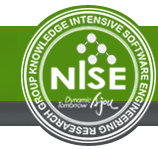 |
 |
|
|
|
|
|
|
Building an
Interoperable and Reusable
Generic Object Model (GenOM) for Software Computing |
|
Project Keywords:
Object Modeling, Software Patterns, Ontology, Semantic Web,
Intelligent Information Integration,
Project Description:
In designing and implementing any “intelligent” software
application by using object-oriented technologies, it is
essential to address the following three characteristics: 1)
object modeling in its representation, 2) usage of objects in
its application model, and 3) ability to aggregate evidence that
supports the analysis of objects’ behaviors (through the
associated properties and relationships between objects). The
harmonization of these characteristics often determines the
level of intelligence of the applications. When a software
computing paradigm converges toward domain-independent
interdisciplinary research, the objects (or models) used in each
application model should be interoperable and reusable. In this
research project, we build such an interoperable and reusable
object computing environment called Generic Object Model
(GenOM). GenOM Architecture
Selected Documents/Publications: TR-NiSE-05-05, Yavagal, D.S., Lee, S.W., Ahn, G. and Gandhi, R.A. "Common Criteria Requirements Modeling and its Uses for Quality of Information Assurance (QoIA)", To appear in Proceedings of the 43rd Annual ACM Southeast Conference (ACMSE '05), March 18-20, Kennesaw State Univ. Kennesaw, Georgia. 2005. McNally, R., Lee, S.W. and Xiang, W-N. Abstract: “An Ontology-based Approach for Representing and Visualizing Interdependencies across Critical Infrastructures” In Proceedings of the 9th International Computers in Urban Planning and Urban Management Conference (CUPUM ’05), June 29 – July 1. University College London. McNally, R., Lee, S.W., Yavagal, D.S. and Xiang, W-N. “An Ontology-driven Approach to Representing and Visualizing Critical Infrastructure Interdependencies”, In Proceedings of the Auto-Carto 05, A CaGIS Research Symposium, March 18-23, Las Vegas. The Cartography and Geographic Information Society (CaGIS). 2005. McNally, R., Lee, S.W., Yavagal, D.S. and Xiang, W-N. Abstract: “An Object-Oriented Method For Representing And Visualizing Interdependencies Across Critical Infrastructure Layers”, Abstract: The 2005 Meeting of The Association of American Geographers (AAG ‘05), 101st AAG Annual Meeting, April 5-9, Denver, Colorado. 2005. Lee, S.W., Yavagal, D.: GenOM User’s Guide. Technical Report, Dept. of Software and Information Systems, UNC Charlotte. 2004 |
|
|
||||||
|

